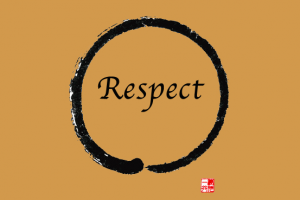Strong kids at Balanced Life Skills from Joe Van Deuren on Vimeo.
How to show respect for yourself
Showing respect for ourselves goes beyond the four ways we discussed in class this week:
- Healthy eating
- exercise
- proper amount of sleep
- personal hygiene
 To have a real self respect it is also important not to be talked into risking our physical or mental health with bad habits such as smoking or drugs. In fact many young people are drawn into that with a dare from others – a dare to do unhealthy or even dangerous acts. But a person who has respect for themselves will not succumb to the ‘peer’ pressure. We know that ‘we matter’. We value our health and our bodies.
To have a real self respect it is also important not to be talked into risking our physical or mental health with bad habits such as smoking or drugs. In fact many young people are drawn into that with a dare from others – a dare to do unhealthy or even dangerous acts. But a person who has respect for themselves will not succumb to the ‘peer’ pressure. We know that ‘we matter’. We value our health and our bodies.
Beyond those things that seem so obvious, it is shows respect for our life when we have a goal or a mission. Even young people can have a mission or a purpose. Having this spelled out, understood that this is why I am doing what I am doing will help us keep everything in perspective. Having and reaching a goal also acts as a building block to the next and possibly larger goal. As we reach them, our self respect goes up, resulting in greater confidence and self esteem.
I was so happy to hear our students when talking about self respect say very early in the conversation that we should speak to ourselves in a positive manner and not put ourselves down if we make a mistake or fail to get something that we were hoping for. They really got the message we talked about when discussing confidence.
How are you looking at that stressor?
The difference between being an optimist and a pessimist is the way we interpret the situation. A pessimist looks at the situation and believes that this is permanent and pervasive. An optimist looks at the same situation and sees it as temporary and fixable.
 A pessimist believes the situation will last forever and will affect everything else in their life and an optimist asks themselves, “Will this thing be that important five years from now, or even next month?” If the answer is yes – then deal with it, if the answer is no – and most of the time it is no – let it go.
A pessimist believes the situation will last forever and will affect everything else in their life and an optimist asks themselves, “Will this thing be that important five years from now, or even next month?” If the answer is yes – then deal with it, if the answer is no – and most of the time it is no – let it go.
Most of the time when stress leads to an outburst it is because the event that has just occurred seems so important and “unfix-able” at the moment. When in fact, most likely there is a solution, and it is not likely that it is really worth fighting about or for. Since stress and the reaction to it is a factor in anger management, we must learn these thinking tips for dealing with them as they come up. Put the stressor into a time perspective.
Take that deep breath or the time out and then put words to your feelings. Decide if this is a permanent or a temporary setback. Decide if it is fixable or even ours to fix. If we are not able to find a calmness, it may be we are attached to a result or we are not getting something that we really want to happen or the way we want someone to be. Is it possible that the change is just not happening in the time frame we wanted it to happen? Can we be optimistic about it happening in the future if we chose to?
Will you know if your child is being picked on?
How would you know if your child is the target of bullying? Most of the time your child will not announce it to you, out of fear of embarrassment, belief that they can or must take of the situation or out of fear of retaliation. Parents and teachers need to be aware of changes in the attitude or conduct of a child so we can take action.
 If we see a pattern develop with a child of being more anxious, especially about particular situations, there may be something happening that is not comfortable for them. If they become anxious about going to school, scouts, a sport activity or any place where there are others around – they may be experiencing some aggression. Please remember it need not be from just other young people. There may be an adult that makes them uncomfortable. I have seen this happen with adults (teachers / coaches) where a child was being treated with sarcasm that caused anxiety and academic issues.
If we see a pattern develop with a child of being more anxious, especially about particular situations, there may be something happening that is not comfortable for them. If they become anxious about going to school, scouts, a sport activity or any place where there are others around – they may be experiencing some aggression. Please remember it need not be from just other young people. There may be an adult that makes them uncomfortable. I have seen this happen with adults (teachers / coaches) where a child was being treated with sarcasm that caused anxiety and academic issues.
Other ways of telling a child may be a target of aggression, include depression, sadness, or safety concerns. Anytime there is a change in the personality, just be aware and take extra time with your child to talk. What should you ask? How do you approach this conversation?
Most of the time asking if they are getting picked on in school is not going to get a response that helps you understand what is happening. Neither is asking how it is going in school today. You most likely will get the “fine” answer or the “good” comment. Our conversation must be ongoing, general giving them the opportunity to feel safe telling us / without telling us. Here is what I mean.
Children are not going to be in a rush to embarrass themselves by telling us that they are having relationship issues in school. On a daily basis – know your child and who their friends are. Do not interrogate, but ask questions that you can put the pieces together. If you know that a child typically plays with Sally and then all of a sudden Sally is no longer in the picture – then that is a warning sign that there may be some relationship issues.
 Without becoming Jack Webb (do you remember that show?) we can learn what is on their mind. What to do at that point is the subject of a seminar I do for parents titled “What to do if your child is being bullied?” This includes how to deal with your child, the school system (public or private) and with the parents of the aggressor.
Without becoming Jack Webb (do you remember that show?) we can learn what is on their mind. What to do at that point is the subject of a seminar I do for parents titled “What to do if your child is being bullied?” This includes how to deal with your child, the school system (public or private) and with the parents of the aggressor.
If you have a specific issue I am available as an advocate or consultant in this subject.
Respect for yourself – 3 part formula for great health – SLEEP
When we talk about respect we must talk about showing respect for yourself. You matter. You are valuable. One of the most valuable thing that matters the most is our health. Staying healthy and taking care of our bodies has a simple formula.
Eat healthy foods + Exercise + Sleep
Cheat on any of these and you will survive (for a while) but you will not perform at your best.
 Here are some tips for the sleep part of our formula.
Here are some tips for the sleep part of our formula.
- Go to bed at the same time every night.
- Get up in the morning at the same time every morning.
- Get 8 – 12 hours of sleep a night depending on your age.
- Young children need more sleep than adults, but even adults should get 7-8 hours every night.
- Turn off all electronics 1 hour prior to heading off to bed.
- Do not do homework or emails (work) laying in bed
- Have a nighttime routine
- Be careful of the foods and drink that you have in the evening. Some of them will inhibit your sleep patterns.
Try these and see a whole new kind of energy for your body. This is one way of showing respect for yourself.
Respectful actions shows others our feelings of value
 The demonstration of respect for others by sharing and taking turns says to the other person, “You matter.” Learning to share for a very young person can be a difficult lesson for some. Especially when we are young, the world naturally revolves around only one person – me. But as our children get older, helping them to see the needs of others and even what they may want is part of their learning to respect or value those needs later.
The demonstration of respect for others by sharing and taking turns says to the other person, “You matter.” Learning to share for a very young person can be a difficult lesson for some. Especially when we are young, the world naturally revolves around only one person – me. But as our children get older, helping them to see the needs of others and even what they may want is part of their learning to respect or value those needs later.
Our children will learn that sharing and taking turns may not be the ‘fun’ thing to do at this moment. Most likely though it is the fair thing to do. Gaining the reputation of being fair, of sharing and taking turns is a way of maintaining friendships.
Even the words we use when we are in conversation with others demonstrates respect. Saying please and thank you, I am sorry, excuse me – are all ways that we show that we see the other person and their feelings as valuable. It shows others that we that we want them to feel that we appreciate them and their needs and wants.
It is not just about knowing and practicing what is expected socially. Good manners and being fair must become a part of who we are as a person – if the respect is not just a show for others, but rather is who we are as a person.
